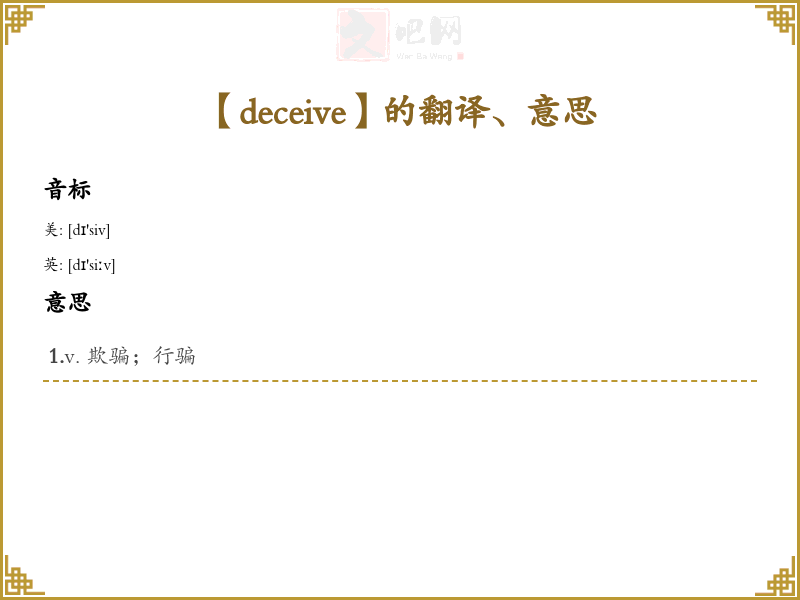【deceive】的翻译、意思
时间: 2025-04-24 02:05:49
【deceive】怎么读
美:[dɪ'siv]
英:[dɪ'siːv]
【deceive】是什么意思、字义解释
1. v. 欺骗;行骗
【deceive】的详细解释
英文单词学*与分析:[deceive]
1. 基本定义
- 字面意思:deceive 的字面含义是“使某人相信不真实的事情”。清晰的定义是:通过撒谎、误导或欺骗使某人对事物的真实情况产生错误的理解。
- 词性:动词。
2. 词源与起源
-
词源分析:deceive 源于拉丁语 "decipere",意为“抓住,欺骗”。这个词由前缀 "de-"(表示“向下”或“完全”)和根词 "capere"(意为“抓住”)组成,结合起来表示“完全抓住(心智)”。
-
历史背景:deceive 最早的使用可追溯到14世纪的英语文献中,通常与欺骗、诈骗有关。
-
课本:在**的教材中,如《新概念英语》中,可能会在初中或高中阶段出现。美国的教材如《Oxford English Dictionary》和《American Heritage Dictionary》中,通常在中学阶段涉及。
3. 使用场景
-
正式与非正式语境:
- 正式:在法律文书中,deceive 常用于描述欺诈行为。例如,“The defendant was found to deceive the investors about the risks involved.”
- 非正式:在日常会话中,deceive 可以用于描述个人关系中的欺骗行为。例如,“I can't believe he tried to deceive me about his plans.”
-
特殊场合:在法律领域,deceive 常与“fraud”(欺诈)一起使用,指的是通过欺骗手段获得不当利益。
- 引证解释:在法律案件中,常会看到“deceive”用作罪名的一部分,如“the act of deceiving is a criminal offense.”
4. 示例句子
-
He tried to deceive his friends by lying about his job.
他试图通过撒谎关于他的工作来欺骗他的朋友。 -
The magician deceived the audience with an astonishing trick.
魔术师用令人惊讶的把戏欺骗了观众。 -
She felt betrayed when she realized he had deceived her.
当她意识到他欺骗了她时,她感到被背叛。 -
The advertisement was found to deceive consumers regarding the product's effectiveness.
这则广告被发现欺骗了消费者关于产品效果的真实情况。 -
It's wrong to deceive people for personal gain.
为了个人利益欺骗他人是错误的。
5. 同义词与反义词
-
同义词:
- mislead:侧重于引导错误的方向,通常没有直接的欺骗意图。
- cheat:通常表示通过不诚实的手段获取利益,含有更强的负面情感。
-
反义词:
- honor:表示尊重和诚实的行为,与欺骗完全相反。
- truth:指真实的状态或事实,deceive 的直接对立。
. 学方法
-
音标记忆法:deceive 的音标是 /dɪˈsiːv/,可以通过音节的组合来记忆。例如,"de-" 听起来像“下”,而 "ceive" 可以联想到“接收”,合在一起可以理解为“接收错误的信息”。
-
词根记忆法:可以拆分为 "de-" 和 "ceive",记住“抓住”的意思,理解为“抓住了错误的东西”。
7. 关联词汇
- 常用搭配:
- deceive someone (欺骗某人)
- deceive oneself (自欺)
- deceive the public (欺骗公众)
- easily deceived (容易受骗)
希望这个分析能帮助你更好地理解和使用“deceive”这个单词!
【deceive】例句
1、[V-T] If you deceive someone, you make them believe something that is not true, usually in order to get some advantage for yourself. 欺骗
-
例:He has deceived and disillusioned us all.他欺骗了我们所有人, 令我们所有人失望至极。
2、[V-T] If something deceives you, it gives you a wrong impression and makes you believe something that is not true. 误导
-
例:Do not be deceived by claims on food labels like "light" or "low fat."不要被食品标签上像“少脂”或“低脂”的字样误导。
